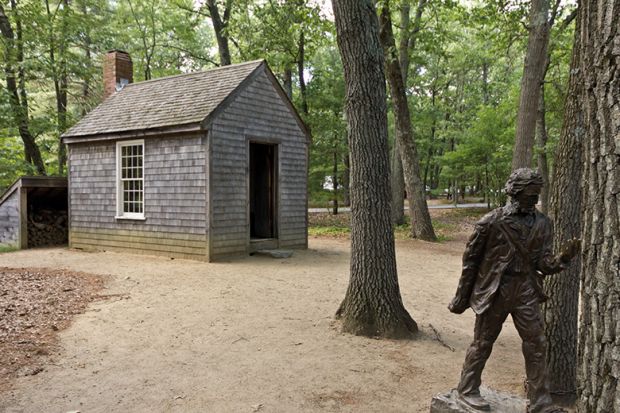This year’s bicentennial of Henry David Thoreau’s birth is producing a festival of reflections on this most celebrated of Americans. His platitudes adorn mugs and T-shirts; the Morgan Library & Museum in Manhattan has mounted an exhibition, This Ever New Self: Thoreau and His Journal; and now Laura Dassow Walls’ magnificent study, Henry David Thoreau: A Life, affords timely and engaging illumination of a man who has often been caricatured. She complicates an already complex figure as her vivid storytelling helps us to focus on Thoreau’s contagious spark.
Thoreau may be a patron saint of environmental protectionism and a founding father of journal writing, yet this account contextualises his struggles, adding flesh and blood (plus humour) to the bare bones of his literary reputation. Like Philip Gura does in Man’s Better Angels: Romantic Reformers and the Coming of the Civil War (2017), Walls paints a broad canvas of political, intellectual and literary ferment, while reproducing the thrum of Thoreau’s inner rumbling. Her tender speculations provide understated insight: what might have happened to Thoreau’s love life, she asks, if he had been born a few generations later? Perhaps he has been miscast as an enemy of technology? His preternatural curiosity about engineering demonstrated that “the coupling of man and nature through machine could still be a thing of wonder”. (He also comments that man-made goods should adhere to “thorough fidelity”, making a pun on his own name.)
Walls’ beguiling descriptions of Thoreau’s lost world prompted me to revisit Walden during a recent trip to Boston. His time in the woods taught him about himself, but also exposed him to outliers: squatters and black and Native Americans relegated to the fringes of society. Thus his communing with nature and daily self-reflections forced a new relationship with mankind, reshaping boundaries and prodding social activism. Walls suggests that Thoreau felt obliged to challenge any society that rang the bell of freedom with one hand while grasping the manacles of slavery with the other.
After graduating from Harvard University, Thoreau returned to Concord in 1837 to discover that his own household had become “a hotbed of radical abolitionism”. From two days in jail (prompting his famed Civil Disobedience) to enthralling public lectures on John Brown, he became a spokesperson for “higher law” philosophy. He pursued his ideals and, with his mentor Ralph Waldo Emerson’s blessing, railed against injustice.
Early in life, Thoreau’s disappointments shaped him as much as his accomplishments: his failed career as a schoolteacher, severe criticism from Margaret Fuller (his first editor) and a miserable flop when he relocated to Manhattan to try to make it in the New York publishing world. To be fair, though, this adventure did win over New York Tribune editor Horace Greeley, whose patronage was critical during lean times.
Eventually, the popularity of his writing kept his vision alive. This passionate biography serves him well, concluding that “from his grave on Author’s Ridge, Thoreau looks down upon the pond he helped create, the spring of wild life there in the midst of death – a constant new creation”. Walls’ splendid recreation of Thoreau reminds us of who this seeker was, what he has become and what he still might be.
Catherine Clinton is the Denman chair of American history at the University of Texas at San Antonio and the author of Stepdaughters of History: Southern Women and the American Civil War.
Henry David Thoreau: A Life
By Laura Dassow Walls
University of Chicago Press, 640pp, £26.50
ISBN 9780226344690
Published 24 July 2017
Register to continue
Why register?
- Registration is free and only takes a moment
- Once registered, you can read 3 articles a month
- Sign up for our newsletter
Subscribe
Or subscribe for unlimited access to:
- Unlimited access to news, views, insights & reviews
- Digital editions
- Digital access to THE’s university and college rankings analysis
Already registered or a current subscriber?




